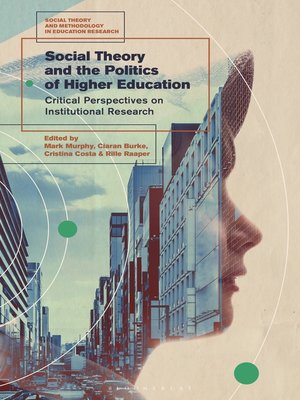Social Theory and the Politics of Higher Education
ebook ∣ Critical Perspectives on Institutional Research · Social Theory and Methodology in Education Research
By Mark Murphy

Sign up to save your library
With an OverDrive account, you can save your favorite libraries for at-a-glance information about availability. Find out more about OverDrive accounts.
Find this title in Libby, the library reading app by OverDrive.



Search for a digital library with this title
Title found at these libraries:
| Library Name | Distance |
|---|---|
| Loading... |
Social Theory and the Politics of Higher Education brings together an international group of scholars who shine a theoretical light on the politics of academic life and higher education. The book covers three key areas:
1) Institutional governance, with a specific focus on issues such as measurement, surveillance, accountability, regulation, performance and institutional reputation.
2) Academic work, covering areas such as the changing nature of academic labour, neoliberalism and academic identity, and the role of gender and gender studies in university life.
3) Student experience, which includes case studies of student politics and protest, the impact of graduate debt and changing student identities.
The editors and chapter authors explore these topics through a theoretical lens, using the ideas of Michel Foucault, Niklas Luhmann, Barbara Adams, Donna Massey, Margaret Archer, Jürgen Habermas, Pierre Bourdieu, Hartmut Rosa, Norbert Elias and Donna Haraway, among others. The case studies, from Africa, Europe, Australia and South America, draw on a wide range of research approaches, and each chapter includes a set of critical reflections on how social theory and research methodology can work in tandem.
1) Institutional governance, with a specific focus on issues such as measurement, surveillance, accountability, regulation, performance and institutional reputation.
2) Academic work, covering areas such as the changing nature of academic labour, neoliberalism and academic identity, and the role of gender and gender studies in university life.
3) Student experience, which includes case studies of student politics and protest, the impact of graduate debt and changing student identities.
The editors and chapter authors explore these topics through a theoretical lens, using the ideas of Michel Foucault, Niklas Luhmann, Barbara Adams, Donna Massey, Margaret Archer, Jürgen Habermas, Pierre Bourdieu, Hartmut Rosa, Norbert Elias and Donna Haraway, among others. The case studies, from Africa, Europe, Australia and South America, draw on a wide range of research approaches, and each chapter includes a set of critical reflections on how social theory and research methodology can work in tandem.







